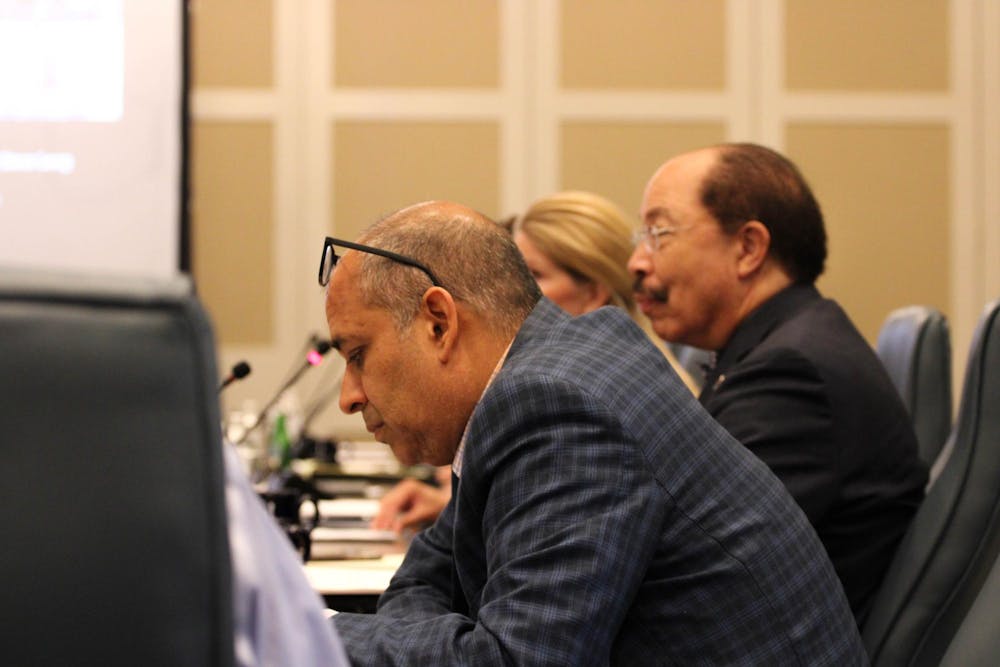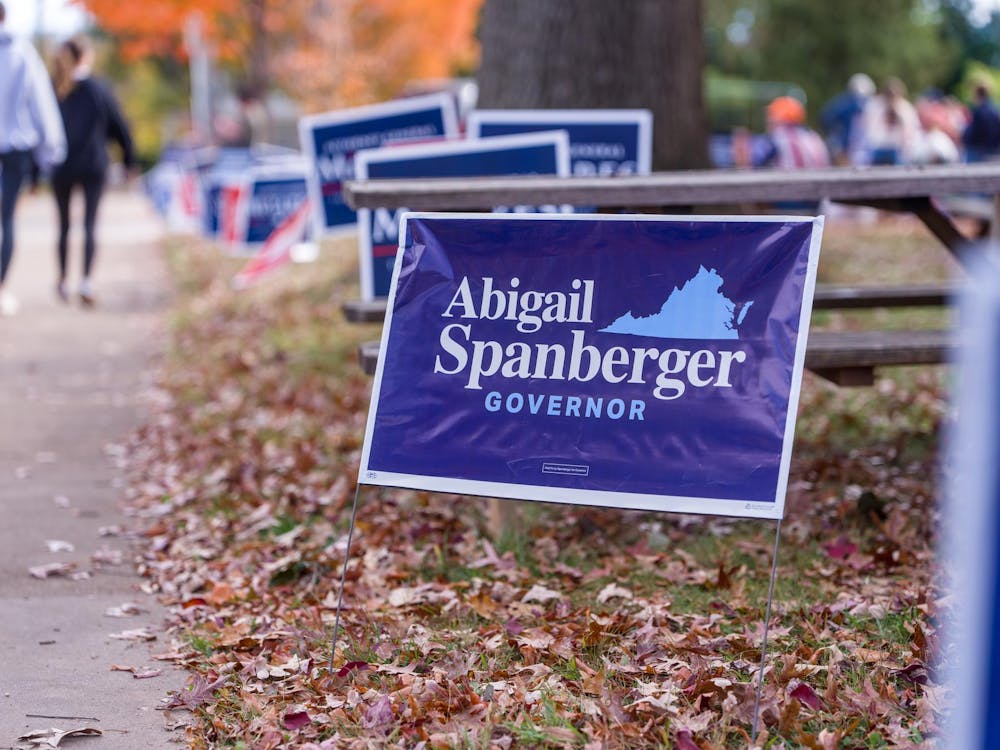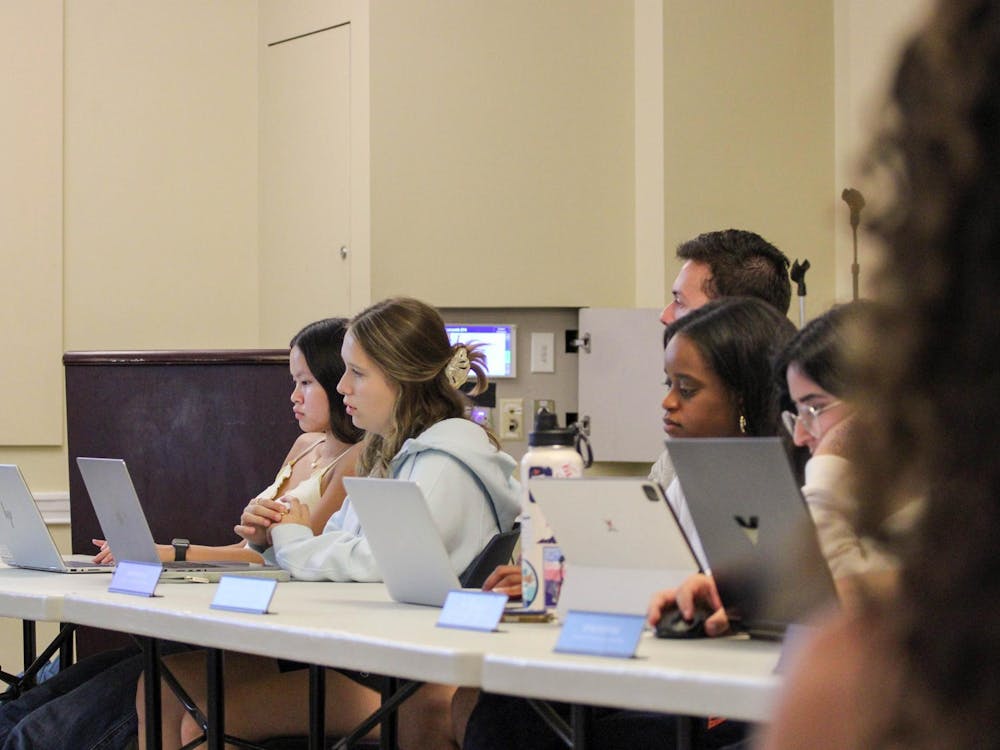The University’s presidential search committee held its second meeting Monday, where it heard updates on the search from external search firm Isaacson, Miller. The firm shared that it is moving through the steps of the search faster than expected and that it is dedicated to preserving the University’s commitments to academic freedom, student self-governance and affordability throughout the process.
The search committee also broke into subcommittees to discuss the priorities and ideal characteristics that various stakeholders have identified as important for a new University president.
The search committee is composed of 28 members with connections to the University, including current Board of Visitors members, students, faculty, administrators and alumni. The search committee serves in an advisory capacity to find a permanent University president following former University President Jim Ryan’s resignation in June and is assisted by the external search firm Isaacson, Miller which will help to review and interview candidates.
Mindy Cimini, senior search coordinator of Isaacson, Miller, provided updates on the responses to the survey posted on the presidential search website, which remains open. There is also a form available on the Isaacson, Miller website accepting applications, nominations and inquiries.
The survey on the University’s website asks a series of questions about top priorities, ideal personal characteristics and important areas of experience that the new president should have. It also asks for primary affiliation to the University, and provides space for free responses to a few questions.
Cimini said that as of Monday, the firm has received 321 responses. According to secretary to the Board Scott Ballenger, the largest share of these responses is from staff at around 34 percent, followed by students at around 28 percent, alumni at around 24 percent and faculty at around 5 percent.
“The identified priorities for the president are to maintain U.Va.’s position as a leader in national higher education, to recruit and retain high-quality faculty, to maintain access and affordability and to enhance the academic excellence and improve the depth … of research and scholarship at U.Va.,” Cimini said.
According to Cimini, the survey reflects what the firm has heard in the eight listening sessions that have been held up to this point. In these listening sessions, the firm has heard from a wide range of constituents including faculty, students, alumni, donors and deans about their visions for the University and its future president.
John Isaacson, chair of the firm’s executive committee, summarized what the firm has gathered from the eight listening sessions.
“[The listening sessions] have been more candid, clearer and more insightful than we usually experience,” Isaacson said. “People have been substantive and impressive in their work, in the way in which they've explained U.Va.’s position and its aspirations for the future.”
Isaacson mentioned that the firm has heard several concerns surrounding U.Va. Health. Specifically, those outside of U.Va. Health see it a “risk” and those inside of U.Va. Health feel isolated from the University and think that the University does not comprehend its asset value. Still, Isaacson said the University Medical Center specifically is very “well-positioned” and has great potential for growth with the right strategies and the right president to lead these initiatives.
“[U.Va. Health] is an astonishing asset,” Isaacson said. “For the next president, strategy for the Health Center is unavoidable, whichever way one chooses to mitigate either risk or maximize assets. Either way, it's going to take a clear-headed strategy.”
U.Va. Health has seen significant change in senior leadership in the past year, including the departures of Melina Kibbe, former dean of the School of Medicine and chief health affairs officer at U.Va. Health, and former University Medical Center CEO Wendy Horton in July. Craig Kent, former chief executive officer of U.Va. Health and executive vice president for health affairs, also resigned in February following alleged misconduct and creation of a culture of fear.
Kelly McLaughlin, managing associate of the firm, discussed Isaacson, Miller's goal of maintaining the unique University experience, which it learned about in the listening sessions as they search for new leadership. Specifically, she mentioned the importance of student self-governance and affordability at the University.
“We learned a lot about the distinctive student experience at U.Va., one that is characterized as positive by many, full of so many rich experiences, and characterized by the core value of student self-governance,” McLaughlin said.
Isaacson also highlighted the University’s core values of autonomy and academic freedom and said that the firm has heard about these values several times in listening sessions.
“A new president will have the task of presenting U.Va. persuasively and accurately in a wide range of public venues with a narrative that can maintain the University's autonomy,” Isaacson said.
Following the report from Isaacson, Miller, the search committee broke into subcommittees to discuss specific priorities in the search for a new president. The chairs of each subcommittee then shared with the whole search committee what they discussed.
Dr. Babur Lateef, student subcommittee chair and former Board member, highlighted the importance of visibility of the new president, especially to students.
“[Students would] like to see someone visible. They want someone who's communicative, collaborative, competent with the complexities of dealing with a large institution,” Lateef said.
Gregory Perryman, student member of the Board and fourth-year College student, also shared that the subcommittee is working on hearing student opinions more broadly, not just student leaders. To do so, they are hoping to expand the reach of their student surveys.
George Martin, faculty, staff and administration subcommittee chair and former Rector, emphasized the role of the new president to maintain positive relationships with faculty and staff.
“The president should be an active listener [and] empathetic,” Martin said. “[They] should possess excellent communication skills, be accessible, especially to students, faculty and staff, and stress meaningful engagement with all stakeholders.”
Martin also noted the president’s role of defending academic freedom and the overall importance of investing in research at the University.
Sherri Moore, faculty, staff and administration subcommittee member and associate Commerce professor, brought up a concern similar to Perryman’s regarding student representation in surveys and listening sessions. Moore emphasized the importance of the subcommittee to work towards reaching all levels of faculty, staff and administration, not just those on representative boards or in leadership positions.
Following Martin’s remarks, Lori McMahon, research subcommittee chair and neuroscience professor, shared that the subcommittee has held two listening sessions so far — one with graduate students and post doctoral fellows and one with the leadership team in the Office of the Vice President for Research. The subcommittee has five more future listening sessions planned. McMahon said that a common sentiment they heard in their listening sessions was the desire for strong strategic investment in research.
Peter Grant, donors, alumni and parents subcommittee chair, said that their subcommittee noted the importance of the new president to have a University background or connection to the University culture, whether they were a student, faculty member or served in an administrative role. The subcommittee has held two listening sessions with alumni and donors so far, and plans to hold another with a group of parents within the next week.
Lastly, Pam Edmonds, communications and coordination subcommittee chair, discussed the subcommittee’s progress in creating a position description — not as a sales pitch, given that people are interested in the position without it — in order to hold the finalists accountable when that time comes.
The agenda also allocated 55 minutes to a closed session, where the whole search committee discussed potential candidates and prospects for the position.
At the end of the closed session meeting, Board Vice Rector Porter Wilkinson said that the search committee will reconvene in October and early November. Wilkinson said that these meetings will include discussion of specific recruitment, and that interviews are tentatively slated for late November. Specific dates for these meetings have not been decided yet.







